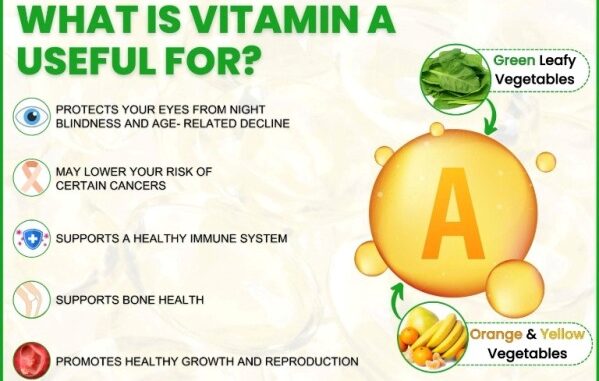
Vitamin A: An Essential Nutrient for Health and Wellness
Vitamin A is a fat-soluble vitamin that plays a crucial role in maintaining vision, promoting healthy skin, supporting the immune system, and ensuring proper cell growth. It is found in two primary forms: preformed vitamin A (retinol), which is found in animal products, and provitamin A (beta-carotene), which is found in plant-based foods. This essential nutrient is vital for overall health and has far-reaching benefits for various bodily functions.
Key Benefits of Vitamin A:
1. Supporting Eye Health and Vision:
One of the most well-known benefits of Vitamin A is its role in maintaining healthy vision. This micronutrient is a key component of rhodopsin, a pigment in the retina that aids in low-light vision. Deficiencies in Vitamin A can lead to night blindness, a condition where the eyes struggle to adjust to low-light environments. By including Vitamin A-rich foods in your diet, such as carrots, sweet potatoes, and leafy greens, you can nurture your eyes and safeguard against vision-related issues.
2. Boosting Immune Function:
Beyond its impact on vision, Vitamin A plays a vital role in supporting the immune system. It contributes to the production and function of white blood cells, which are essential for combating infections and illnesses. Ensuring an adequate intake of Vitamin A through a balanced diet or supplements can help fortify the body’s defenses, reducing the risk of infections and promoting overall immune health.
3. Promoting Skin Health:
Vitamin A is also a beauty secret for healthy skin. It plays a crucial role in cell growth and regeneration, contributing to the maintenance of skin integrity. This nutrient is often used in skincare products and treatments to address various skin conditions, including acne and signs of aging. Including Vitamin A-rich foods in your diet, such as salmon, eggs, and spinach, can contribute to a radiant and healthy complexion from the inside out.
4. Supporting Growth and Development:
Vitamin A plays a vital role in cell growth and differentiation, which is crucial for the normal development of tissues and organs. It is especially important during periods of rapid growth, such as pregnancy and early childhood. Adequate vitamin A intake ensures proper development of the heart, lungs, kidneys, and other vital organs in fetuses and young children.
5. Reducing the Risk of Chronic Diseases:
Vitamin A’s antioxidant properties help neutralize free radicals in the body, reducing the risk of chronic diseases like cancer and heart disease. By protecting cells from oxidative stress, vitamin A helps slow down the aging process and supports overall cellular health.
Best Sources of Vitamin A
Vitamin A is found in a variety of foods, both plant-based and animal-derived. While animal and dairy products are rich sources of preformed Vitamin A (retinol), plant-based foods provide provitamin A carotenoids, which the body can convert into active Vitamin A.
Excellent sources include:
- Animal products: liver, eggs, and dairy products are rich sources of preformed Vitamin A (retinol).
- Orange and yellow vegetables: carrots, sweet potatoes, and squash (rich in beta-carotene)
- Leafy greens: spinach, kale, and broccoli
- Fruits: mangoes, apricots, and papayas
Conclusion:
In the intricate dance of human health, Vitamin A takes center stage, contributing to vision, immune function, and skin integrity. By embracing a diverse and balanced diet that includes a variety of Vitamin A-rich foods, you empower your body with the nutrients it needs to thrive. Unlock the potential of this essential micronutrient and embark on a journey towards a healthier, more vibrant you. To know more about the Vitamin A, visit or call Yuvaan Naturopathy and Ayurved Center in Indirapuram, Ghaziabad.




Be the first to comment